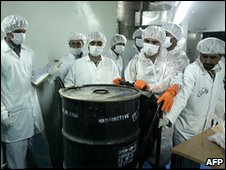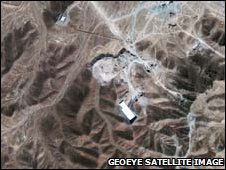|
By Paul Reynolds
World affairs correspondent, BBC News website
|


Iran has insisted it will not stop enriching uranium
|
Iran's announcement that it intends to build another 10 uranium enrichment plants is a typically defiant response to international demands for it to stop work on a previously-secret underground site. Whether this is more than a rhetorical rebuff remains to be determined. Iran's President Mahmoud Ahmadinejad linked the sites to an expansion of nuclear power in Iran. But Iran has only one such power plant, dating back to the Shah's time and it is only now being completed by the Russians. There are no concrete plans for any more, so this announcement represents at the moment an ambition only. What it indicates is that recent negotiations to achieve a compromise might be heading nowhere. Iran's government appears to think once again that it is strengthened internally by external confrontation. Another aspect of Mr Ahmadinejad's statement is that he is threatening to enrich uranium higher than the level needed for nuclear fuel, for potential use in a medical reactor. However, Iran cannot produce the fuel rods from such materials. Only France and Argentina can, according to experts. So again the motivation is not clear, beyond defiance. Sanctions Iran's attitude and the latest criticism of Iran by the International Atomic Energy Agency (IAEA) are signs that that new sanctions could be on the way. And down the road, the Israelis will be watching. Israel is not and will not be convinced that Iran's intentions are peaceful. New sanctions would have to be given time to work. But a military strike at some stage cannot be ruled out. Resolution The IAEA resolution, censuring Iran's secret construction of a uranium enrichment plant near Qom, was supported by Russia and China. This does not mean they will join in a new round of international measures against Iran. But it does mean that Iran cannot count on them for diplomatic support. And it shows that Russia might not supply Iran with the S-300 anti-missile system that Iran has ordered. That would be a sanction in itself. President Barack Obama has indicated that he will assess the Iranian position by the end of the year. If he goes for more sanctions, he will try to get Russia and China on board. If he cannot, he will act with fellow negotiators Britain, France and Germany, plus, he hopes, the whole EU and other players. Target oil The UN Security Council has approved three rounds of sanctions so far - covering trade in nuclear material, as well as travel and financial restrictions aimed at Iranian organisations and individuals. If there are to be new sanctions, then the targets will be Iran's oil trade, especially its reliance on imported refined petroleum products, and the buzzword is reinsurance.
Reinsurance is the means by which insurers can protect themselves against losses and the idea would be to stop or dissuade companies from proving such services for trade with Iran. According to Wilkie, Farr and Gallaher, an international law firm, the intent is this: "The Obama Administration's sanctions could affect most Iranian import and export trade. "[Its] proposals could ban goods, services, technology, information, or other activities that support the importation or production of refined petroleum by Iran, including refinery construction, modernization, and repair." Some governments might be satisfied with that for the time being, bearing in mind that there is no evidence of actual nuclear bomb-making activity and Iran's repeated insistence that it will not build any such device. Paul.Reynolds-INTERNET@bbc.co.uk
|

~RS~q~RS~~RS~z~RS~03~RS~)






Bookmark with:
What are these?